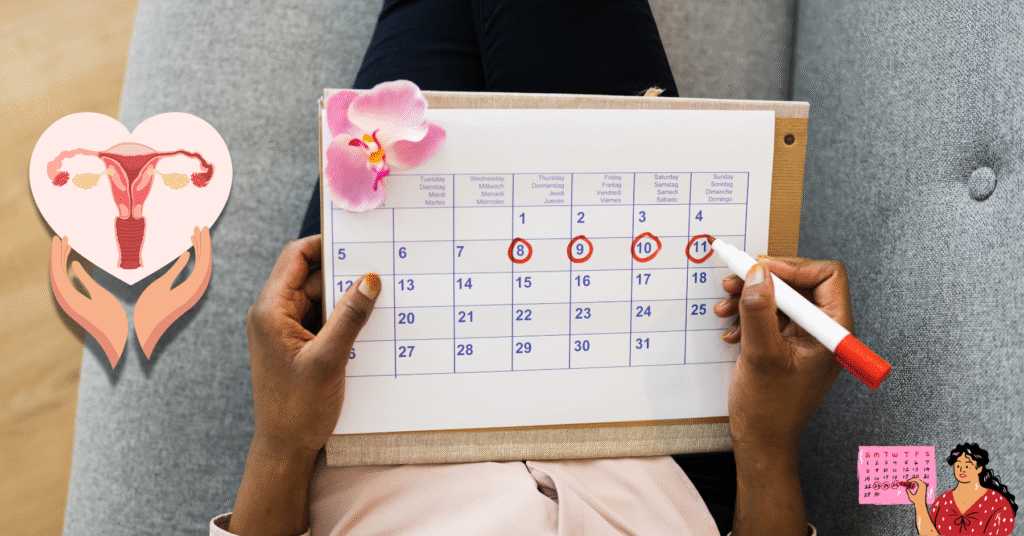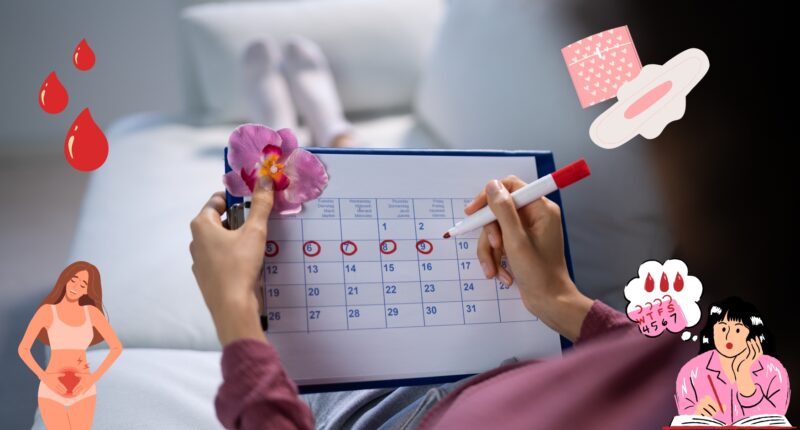Most of us learn pretty early in life that our menstrual cycle brings both physical and emotional changes. Cramping, bloating, mood swings, and low energy are often seen as unavoidable parts of being a woman. PMS especially has a reputation for being a dreaded week of discomfort and irritability.
But here’s what many people don’t realize: your menstrual cycle is not just about the days you bleed or the days you feel premenstrual. Your cycle actually has four distinct phases, each one bringing hormonal shifts that influence your mood, your energy levels, and even your productivity.
If you’ve ever noticed bursts of motivation followed by stretches where you can barely focus, that’s not random. It’s your hormones at work. And when you learn how to work with your cycle instead of against it, you can tap into your body’s natural rhythm and make your work, relationships, and self-care feel a lot more manageable.
Rethinking Periods and Productivity
When most of us think of the menstrual cycle, we picture two main stages: the days we bleed and the days we don’t. Maybe we’re also vaguely aware of ovulation happening somewhere in the middle. But this way of thinking misses a lot of what’s actually going on.
The truth is, there are four separate phases, not two. Each one is driven by shifting hormone levels, which impact how your brain and body function. Another common misunderstanding is that PMS is always terrible. Many people treat that week as a write-off, assuming it’s all mood swings and fatigue. But PMS, and the cycle as a whole, doesn’t have to feel like the enemy.
The more you understand what’s happening in your body, the easier it becomes to see that every phase offers its own strengths.
A Fresh Perspective on the Menstrual Cycle
Dr. Allison Devine, an OB-GYN at the Austin Diagnostic Clinic, points out that most of the research on female hormones has focused on problems and imbalances. This has led to a medical system that often suppresses women’s cycles with synthetic hormones rather than helping them embrace their natural rhythms.
Instead, Devine suggests we should be learning how hormonal changes can actually support us. Your cycle is not something to “get through.” It can be used as a tool to better understand your energy, your focus, and your emotional state.
Three hormones are especially important throughout the month. Estrogen and progesterone are the well-known female sex hormones, while testosterone, although present in smaller amounts, plays a surprising role in motivation and drive. Together, these three shape the ups and downs of your cycle.
The Four Phases of the Menstrual Cycle
Let’s look at what’s really happening in each phase and how you can adjust your work and lifestyle to match your body’s natural flow.
Menstruation Phase (Days 1–7)
This is the phase most of us know best because it’s when bleeding occurs. It usually lasts between three and seven days.
During menstruation, hormone levels drop. Estrogen and progesterone are at their lowest, which explains why many people feel drained and sluggish. Concentration is harder, and emotions can feel heavier than usual.
From a productivity perspective, this is your lowest-energy time of the month. Rather than forcing yourself to push through, it helps to lighten your load if possible. Focus on simpler tasks like catching up on email, reviewing notes, or organizing files. Give yourself space to rest and reflect. Think of it as a natural reset button for the month ahead.
Follicular Phase (Days 8–13)
Once menstruation ends, energy starts to return. Estrogen begins to rise, testosterone increases, and progesterone remains low. This hormonal shift brings a renewed sense of focus, optimism, and mental clarity.
This is a great time to brainstorm new ideas, set goals, and start fresh projects. Your brain is primed to learn new skills and tackle challenges. If you’ve been putting off creative work or big-picture planning, this is your chance to dive in.
The follicular phase feels like spring: fresh, inspiring, and full of new possibilities.
Ovulation Phase (Days 14–16)
Ovulation only lasts about 24 hours, but the effects of the hormones around this time can stretch for three or four days. Estrogen and testosterone are at their peak, while progesterone begins to rise.
The result is a noticeable boost in confidence, energy, and sociability. You may feel more outgoing, assertive, and magnetic during this time.
Because communication and collaboration come more naturally, ovulation is the perfect time for important meetings, presentations, and networking. It’s also a great moment to tackle group projects or anything that requires you to shine in front of others.
Think of this phase as the summer of your cycle: bright, energetic, and outward-focused.
Luteal Phase (Days 17–28)
If the egg isn’t fertilized, your body enters the luteal phase, which lasts about 12 to 14 days. At first, estrogen and progesterone rise, with progesterone reaching its highest levels. Later, both hormones drop sharply, leading to the familiar PMS symptoms many people experience.
Progesterone has a calming effect, so the first part of this phase often feels slower and more reflective. As hormone levels drop toward the end, energy decreases and mood changes may show up.
This is not the best time to push yourself into high-stakes situations. Instead, focus on finishing tasks you’ve already started. Editing, reviewing, and tying up loose ends are perfect for this phase. It’s also a good idea to practice self-care, eat nourishing foods, and avoid overloading your schedule.
The luteal phase feels like autumn: a time to slow down, look inward, and prepare for the cycle to start again.

Why Cycle Syncing Matters
The idea of “cycle syncing” has gained popularity because it gives women a framework for aligning work, diet, exercise, and lifestyle with the four phases of the menstrual cycle.
By planning your tasks around your natural hormonal rhythms, you can avoid burnout, reduce stress, and even ease PMS symptoms. Cycle syncing isn’t about perfection or rigid rules. It’s about tuning into your body and noticing the patterns that already exist.
Some of the benefits include:
- Boosting productivity without pushing past your limits
- Feeling more balanced emotionally and mentally
- Understanding yourself better and building self-confidence
- Turning what once felt like a weakness into a strength
Practical Ways to Work with Your Period
Start by tracking your cycle, whether through an app or a simple calendar. Knowing which phase you’re in helps you anticipate changes in your energy and mood. From there, you can make small adjustments that add up over time.
During menstruation, honor your need for rest. Avoid major deadlines or high-pressure events if possible. In the follicular phase, lean into your creativity and use the mental clarity to brainstorm and learn. Ovulation is your time to shine, so schedule key meetings, collaborations, or presentations then. And in the luteal phase, focus on wrapping up projects and practicing self-care.
It also helps to support your body with the right foods. Iron-rich meals during menstruation can help replenish your body, while protein and healthy fats during ovulation keep your energy steady. In the luteal phase, complex carbs can ease mood swings and cravings. Pair this with exercise that matches your energy, from restorative yoga during menstruation to more intense workouts during ovulation.
Embracing Your Cycle
For too long, menstrual cycles have been framed as an inconvenience or a problem to hide. But your cycle is not something that holds you back. It’s a powerful tool for understanding yourself and working smarter, not harder.
When you start to see your period as part of a larger rhythm, you can embrace the unique opportunities each phase brings. You stop fighting your hormones and instead use them to your advantage.
Working with your period rather than against it means leaning into the times of high energy and creativity while giving yourself permission to rest and reflect when your body asks for it. It’s a shift in mindset that allows you to thrive in every aspect of life, not just endure your cycle.









